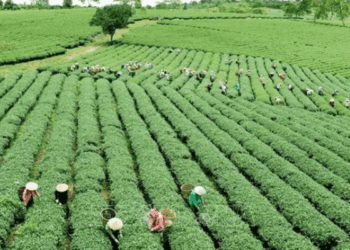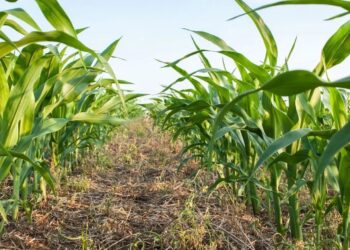Nigeria’s ambition to transform its agricultural sector and reclaim its role as a leading food producer in Africa has been tested over the years by persistent policy and investment gaps
According to new findings from the Policy Monitoring Report (PMR) 2025 released under the Monitoring and Analysing Food and Agricultural Policies (MAFAP) Programme of the Food and Agriculture Organization (FAO) Nigeria falls significantly short of the 10 per cent target pledged under the Kampala Declaration of 2025 and the Comprehensive Africa Agriculture Development Programme (CAADP).
The report, which assessed government support to food and agriculture between 2015 and 2021, highlights both progress and setbacks in policy implementation. It underscores that while nominal agricultural spending increased in the period, it remained at just 2 per cent of federal expenditure.
The PMR paints a complex picture of Nigeria’s agricultural policy outcomes. Crops such as rice benefitted from protective trade measures, which pushed up domestic prices and provided producers with a level of stability. This aligns with Nigeria’s long-running emphasis on rice self-sufficiency, which has led to restrictions on imports and significant government backing.
However, the story was less encouraging for other staples. Maize and sorghum producers continue to face what the report terms “persistent disincentives,” largely due to weak market integration and restrictive trade rules that limit competitiveness.
For export commodities like cocoa and cashew, long-standing challenges persist, including poor quality control standards, high logistics costs, and currency misalignments that erode producer margins.
“This imbalance in policy effectiveness reflects the need for a more coherent approach that balances short-term protection with long-term structural reforms,” the report notes.
Presenting the report, Dr. Marco Sánchez, FAO’s Deputy Director of Agrifood Economics and Policy and Head of the MAFAP Programme, stressed that Nigeria’s policy reforms must be evidence-driven and more strategically targeted.
“The recommendations are geared towards optimising public spending, improving trade and value chains, and ensuring coherence between macroeconomic and sectoral policies, this will enable Nigeria to not only raise productivity but also ensure that agricultural growth is inclusive and sustainable, ” Dr. Sánchez said.
Experts recommend an optimisation of spending by combining long-term investments in infrastructure and research with short-term productivity support for farmers, improving trade and value chains for maize, sorghum, and other staples that have not received the same level of policy attention as rice and streamlining export procedures for cocoa, cashew, and other high-value crops to reduce costs and improve competitiveness.
They also suggested the alignment of macroeconomic policies including foreign exchange management with sectoral priorities to reduce distortions.
According to report, the findings have important implications for Nigeria’s National Agricultural Technology and Innovation Policy (NATIP 2022–2027), which is designed to modernize the sector through technology adoption, extension services, and private-sector partnerships.
NATIP aims to address low productivity and ensure food security, but the PMR indicates that without improved policy coherence and financing, progress will remain limited.
The PMR also ties into CAADP commitments, which urge African governments to allocate at least 10 percent of public expenditure to agriculture to drive annual sector growth of 6 per cent. Nigeria’s current allocation of just 2 per cent not only undermines its domestic agricultural targets but also falls short of regional expectations, potentially weakening its leadership role in African agricultural policy reform.
“CAADP is not just a continental framework; it’s a social contract with African citizens, Nigeria’s ability to meet these commitments will have ripple effects across West Africa and the continent as a whole,” said an FAO official.
The report’s findings were shared at an interactive dialogue involving government officials, private sector leaders, and development partners. Participants underscored the urgency of addressing structural bottlenecks in the sector.
FAO reaffirmed its continued support through the MAFAP Programme, which is funded by the Bill & Melinda Gates Foundation and has supported over 30 agricultural policy and investment reforms across sub-Saharan Africa in the past decade.
“Nigeria’s agricultural transformation is not just about food security; it is about jobs, inclusive growth, and resilience, as one of Africa’s largest and fastest-growing economies, Nigeria’s progress will have far-reaching implications for regional stability and prosperity”, FAO emphasised. “
Experts argue that Nigeria’s future success depends on policy coherence, ensuring that trade, fiscal, and macroeconomic policies work in harmony with agricultural objectives. For example, while rice policies have created a measure of self-sufficiency, they have also raised consumer prices, highlighting the need for balancing farmer incentives with consumer welfare.
Similarly, without tackling infrastructure bottlenecks, high transport costs, and weak extension systems, the benefits of agricultural investment will remain uneven. The PMR urged Nigeria to adopt a more integrated approach, linking federal and state-level policies while encouraging greater participation of the private sector and farmer organisations.
The PMR 2025 offers both a reality check and a roadmap for Nigeria’s agricultural sector. While the government has demonstrated intent through NATIP and regional commitments under CAADP, the gap between ambition and implementation remains wide.
FAO stressed that Nigeria must increase agricultural spending, align policies across sectors, and remove systemic barriers if it is to achieve lasting transformation. Failure to act risks leaving millions of smallholder farmers trapped in cycles of low productivity and poverty, while success could place Nigeria at the forefront of Africa’s agricultural renaissance.
“Evidence-based reforms are not optional. They are the foundation for building a resilient, inclusive, and sustainable agricultural future for Nigeria”, Sánchez added.





